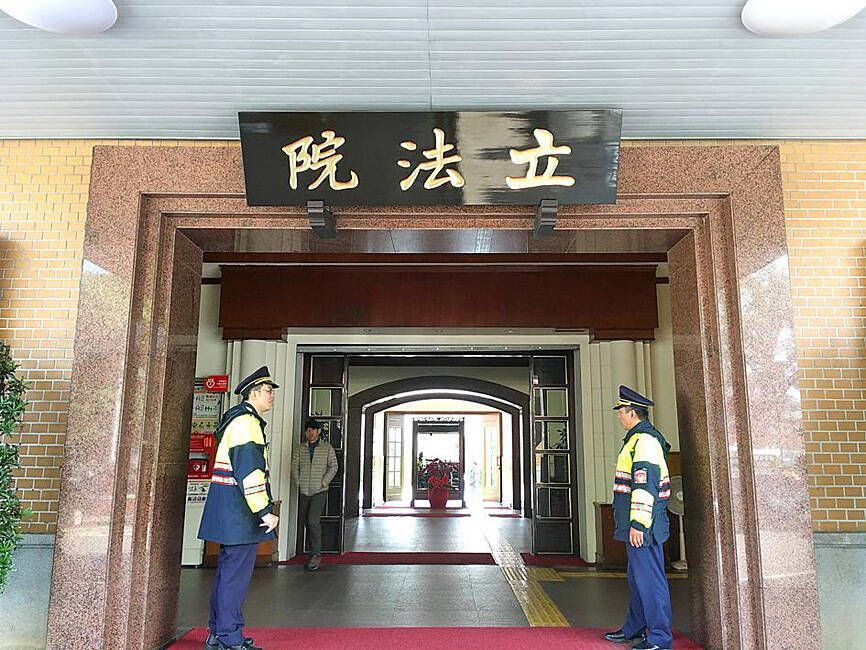Democratic Progressive Party (DPP) Legislators Lai Jui-lung (賴瑞隆) and Puma Shen (沈伯洋) have proposed amendments to regulate lawmakers’ visits to China.
Legislators and elected representatives who have access to high-level classified materials should be included with military and intelligence personnel in facing restrictions when visiting China, to prevent leaks that could endanger national security, they said.
Lai proposed amending the Legislators’ Conduct Act (立法委員行為法) to require legislators who had attended closed-door meetings on national security matters to disclose their travel itineraries when visiting China, Hong Kong or Macau.

Photo: Lin Liang-sheng, Taipei Times
Shen seeks to amend the Act Governing Relations Between the People of the Taiwan Area and the Mainland Area (台灣地區與大陸地區人民關係條例) to require legislators and other elected officials to obtain permission from a supervisory government agency before traveling to China.
“Our amendments are not to ban pan-blue camp legislators from visiting China. The important issue is that when they travel and hold talks with Chinese Communist Party officials, they should report back on those meetings,” Shen said.
“It should be their responsibility to report who they spoke with, their roles in China ... what was discussed. They should be required to inform the government” about the visits, he said.
The proposals were introduced last week, as the Chinese Nationalist Party (KMT) lawmakers traveled to China.
Two ways to update the rules are to amend the law governing cross-strait relations or the National Intelligence Service Act (國家情報工作法), Shen said.
“Legislators have a duty to monitor the government. Therefore, they must alert the public to how dangerous it is when legislators visit China,” Lai said.
“We know that China is focused on stealing our national secrets, to obtain information on highly classified materials, but legislators must remain loyal to this country and keep these national secrets from leaking out,” he said.
“If we do not amend the laws to restrict this kind of travel, to require legislators exercise self-discipline, then China can gain easy access to military and national secrets through the legislature, which is the simplest and most direct channel for China,” he added.
“It is our sincere hope that the ruling party and opposition parties take up this stance to defend Taiwan’s military and national secrets, no matter which party is in charge of the executive branch,” Lai said.

Taiwan has received more than US$70 million in royalties as of the end of last year from developing the F-16V jet as countries worldwide purchase or upgrade to this popular model, government and military officials said on Saturday. Taiwan funded the development of the F-16V jet and ended up the sole investor as other countries withdrew from the program. Now the F-16V is increasingly popular and countries must pay Taiwan a percentage in royalties when they purchase new F-16V aircraft or upgrade older F-16 models. The next five years are expected to be the peak for these royalties, with Taiwan potentially earning

STAY IN YOUR LANE: As the US and Israel attack Iran, the ministry has warned China not to overstep by including Taiwanese citizens in its evacuation orders The Ministry of Foreign Affairs (MOFA) yesterday rebuked a statement by China’s embassy in Israel that it would evacuate Taiwanese holders of Chinese travel documents from Israel amid the latter’s escalating conflict with Iran. Tensions have risen across the Middle East in the wake of US and Israeli airstrikes on Iran beginning Saturday. China subsequently issued an evacuation notice for its citizens. In a news release, the Chinese embassy in Israel said holders of “Taiwan compatriot permits (台胞證)” issued to Taiwanese nationals by Chinese authorities for travel to China — could register for evacuation to Egypt. In Taipei, the ministry yesterday said Taiwan

Taiwan is awaiting official notification from the US regarding the status of the Agreement on Reciprocal Trade (ART) after the US Supreme Court ruled US President Donald Trump's global tariffs unconstitutional. Speaking to reporters before a legislative hearing today, Premier Cho Jung-tai (卓榮泰) said that Taiwan's negotiation team remains focused on ensuring that the bilateral trade deal remains intact despite the legal challenge to Trump's tariff policy. "The US has pledged to notify its trade partners once the subsequent administrative and legal processes are finalized, and that certainly includes Taiwan," Cho said when asked about opposition parties’ doubts that the ART was

If China chose to invade Taiwan tomorrow, it would only have to sever three undersea fiber-optic cable clusters to cause a data blackout, Jason Hsu (許毓仁), a senior fellow at the Hudson Institute and former Chinese Nationalist Party (KMT) legislator, told a US security panel yesterday. In a Taiwan contingency, cable disruption would be one of the earliest preinvasion actions and the signal that escalation had begun, he said, adding that Taiwan’s current cable repair capabilities are insufficient. The US-China Economic and Security Review Commission (USCC) yesterday held a hearing on US-China Competition Under the Sea, with Hsu speaking on